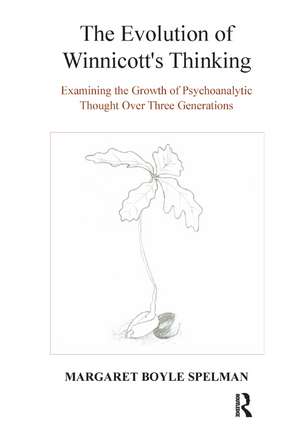The Evolution of Winnicott's Thinking: Examining the Growth of Psychoanalytic Thought Over Three Generations
Autor Margaret Boyle Spelmanen Limba Engleză Hardback – 31 iul 2019
Preț: 821.10 lei
Preț vechi: 918.44 lei
-11% Nou
Puncte Express: 1232
Preț estimativ în valută:
157.14€ • 162.81$ • 131.14£
157.14€ • 162.81$ • 131.14£
Carte tipărită la comandă
Livrare economică 21 martie-04 aprilie
Preluare comenzi: 021 569.72.76
Specificații
ISBN-13: 9780367327835
ISBN-10: 036732783X
Pagini: 368
Dimensiuni: 152 x 229 mm
Greutate: 0.84 kg
Ediția:1
Editura: Taylor & Francis
Colecția Routledge
Locul publicării:Oxford, United Kingdom
ISBN-10: 036732783X
Pagini: 368
Dimensiuni: 152 x 229 mm
Greutate: 0.84 kg
Ediția:1
Editura: Taylor & Francis
Colecția Routledge
Locul publicării:Oxford, United Kingdom
Public țintă
Professional Practice & DevelopmentCuprins
Introduction -- The Evolution of Winnicott’s Thinking -- Winnicott’s own maturational process and facilitating environment -- The evolution of Winnicott’s thinking on thinking and on influence -- Winnicott’s Analytic “Children” -- Marion Milner -- Enid Balint -- Masud Khan -- Margaret Little -- Harry Guntrip -- A summary of Winnicott’s thinking evolving in that of his analytic “children” -- Winnicott’s Analytic “Grandchildren” -- Enid Balint’s analytic “children”: Juliet Hopkins, Jennifer Johns, and Juliet Mitchell -- Masud Khan’s analytic “children”: Christopher Bollas and Adam Phillips -- Marian Milner’s analytic “children”: Pearl King and Andreas Giannakoulas -- Margaret Little’s analytic “child”: Ralph Layland -- A summary of the evolution of Winnicott’s thinking in that of his analytic “grandchildren” -- Conclusion -- Chronology of Winnicott’s thinking with characteristics and facilitative features -- Content analysis
Descriere
This book looks at the nature of Winnicott's thought and its influence. It first examines the development of Winnicott's thinking through his own life time (first generation) and then continues this exploration by viewing the thinking in members of the group with a strong likelihood of influence from him; his analysands and their analysands.
